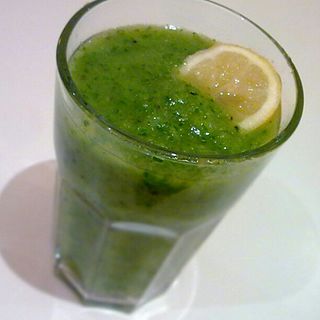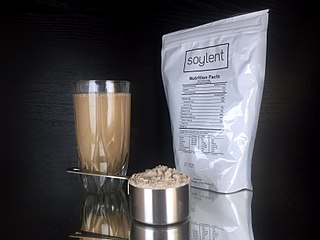Dieting is the practice of eating food in a regulated way to decrease, maintain, or increase body weight, or to prevent and treat diseases such as diabetes and obesity. As weight loss depends on calorie intake, different kinds of calorie-reduced diets, such as those emphasising particular macronutrients, have been shown to be no more effective than one another. As weight regain is common, diet success is best predicted by long-term adherence. Regardless, the outcome of a diet can vary widely depending on the individual.

The Atkins diet is a low-carbohydrate fad diet devised by Robert Atkins in the 1970s, marketed with claims that carbohydrate restriction is crucial to weight loss and that the diet offered "a high calorie way to stay thin forever".

Joel Fuhrman is an American celebrity doctor who advocates a plant-based diet termed the nutritarian diet which emphasizes nutrient dense foods. His practice is based on his nutrition-based approach to obesity and chronic disease, as well as promoting his products and books. He has written books promoting his dietary approaches including the bestsellers Eat to Live, Super Immunity,The Eat to Live Cookbook,The End of Dieting (2016) and The End of Heart Disease (2016). He sells a related line of nutrition related products.

The Scarsdale diet is a high-protein low-carbohydrate fad diet designed for weight loss created in the 1970s by Herman Tarnower, named for the town in New York where he practiced cardiology, described in the book The Complete Scarsdale Medical Diet plus Dr. Tarnower's Lifetime Keep-Slim Program, which Tarnower wrote with self-help author Samm Sinclair Baker.

A fad diet is a diet that becomes popular for a short time, similar to fads in fashion, without being a standard dietary recommendation, and often making pseudoscientific or unreasonable claims for fast weight loss or health improvements. Fad diets are not supported by clinical research and their health recommendations are not peer-reviewed, thus they often make unsubstantiated statements about health and disease.

Low-carbohydrate diets restrict carbohydrate consumption relative to the average diet. Foods high in carbohydrates are limited, and replaced with foods containing a higher percentage of fat and protein, as well as low carbohydrate foods.
The Hacker's Diet is a diet plan created by the founder of Autodesk, John Walker, outlined in an electronic book of the same name, that attempts to aid the process of weight loss by more accurately modeling how calories consumed and calories expended actually impact weight. Walker notes that much of our fat free mass introduces signal noise when trying to determine how much weight we're actually losing or gaining. With the help of a graphing tool, he addresses these problems. Factoring in exercise, and through counting calories, one can calculate one's own total energy expenditure and cut back calorie intake or increase exercise to lose weight.

Weight gain is an increase in body weight. This can involve an increase in muscle mass, fat deposits, excess fluids such as water or other factors. Weight gain can be a symptom of a serious medical condition.
Body for Life (BFL) is a 12-week nutrition and exercise program, and also an annual physique transformation competition. The program utilizes a low-fat high-protein diet. It was created by Bill Phillips, a former competitive bodybuilder and previous owner of EAS, a manufacturer of nutritional supplements. It has been popularized by a bestselling book of the same name.
A negative-calorie food is food that supposedly requires more food energy to be digested than the food provides. Its thermic effect or specific dynamic action—the caloric "cost" of digesting the food—would be greater than its food energy content. Despite its recurring popularity in dieting guides, there is no evidence supporting the idea that any food is calorically negative. While some chilled beverages are calorically negative, the effect is minimal and requires drinking very large amounts of water, which can be dangerous, as it can cause water intoxication.
The Cambridge Diet was a very-low-calorie meal replacement fad diet developed in the 1960s. The diet launched with different versions in the US and the UK. The US version filed for bankruptcy and shut down shortly after the deaths of several dieters. The UK diet has also been known as the Cambridge Weight Plan, but is now known as The 1:1 Diet.

A very-low-calorie diet (VLCD), also known as semistarvation diet and crash diet, is a type of diet with very or extremely low daily food energy consumption. VLCDs are defined as a diet of 800 kilocalories (3,300 kJ) per day or less. Modern medically supervised VLCDs use total meal replacements, with regulated formulations in Europe and Canada which contain the recommended daily requirements for vitamins, minerals, trace elements, fatty acids, protein and electrolyte balance. Carbohydrates may be entirely absent, or substituted for a portion of the protein; this choice has important metabolic effects. Medically supervised VLCDs have specific therapeutic applications for rapid weight loss, such as in morbid obesity or before a bariatric surgery, using formulated, nutritionally complete liquid meals containing 800 kilocalories or less per day for a maximum of 12 weeks.
The Stillman Diet is a high-protein, low-carbohydrate diet that was created in 1967 by physician Irwin Maxwell Stillman (1896–1975).
The South Beach Diet is a popular fad diet developed by Arthur Agatston and promoted in a best-selling 2003 book. It emphasizes eating food with a low glycemic index, and categorizes carbohydrates and fats as "good" or "bad". Like other fad diets, it may have elements which are generally recognized as sensible, but it promises benefits not backed by supporting evidence or sound science.

A meal replacement is a drink, bar, soup, etc. intended as a substitute for a solid food, usually with controlled quantities of calories and nutrients. Some drinks come in powdered form or pre-mixed health shakes that can be cheaper than solid foods with identical health qualities. Medically prescribed meal replacement drinks include the body's necessary vitamins and minerals. Bodybuilders sometimes use meal replacements, not formulated for weight loss, to save food preparation time when eating 5-6 meals a day.
Fred Pescatore is a Manhattan-based author and internist who specializes in nutrition. He is best known as the author of the bestselling children's health book Feed Your Kids Well (1998) and The Hamptons Diet (2004).
KE diet, also known as feeding tube diet, is a fad diet in which an individual is fed a proprietary mixture through a feeding tube for a specific number of days. The dieter does not eat anything while on the diet. It has also been called the "Feeding Tube" diet in the United States.
A monotrophic diet is a type of diet that involves eating only one food item or one type of food. Monotrophic diets may be followed for food faddism motives, as a form of crash dieting, to initiate an elimination diet or to practice an extreme form of alternative medicine.

Protein Power is a high-protein, low carbohydrate fad diet developed by physician Michael R. Eades and his wife Mary Dan Eades.









